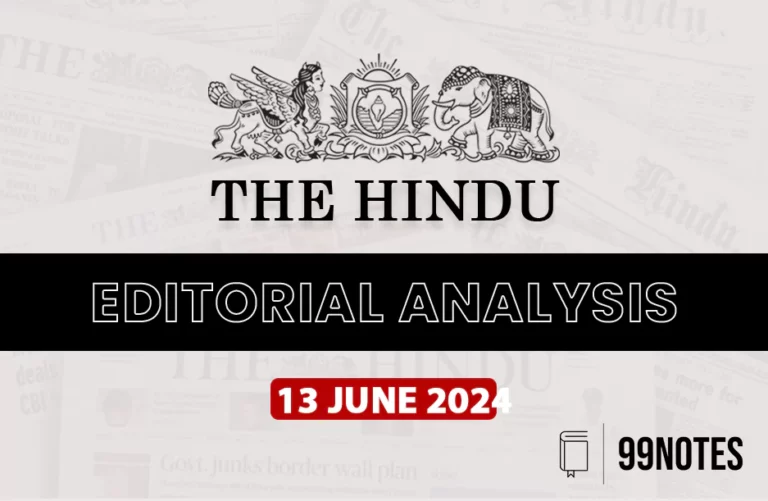19 April 2024 : The Hindu Editorial Notes PDF
The Hindu EDITORIAL
19-April-2024
1. A world in disarray, a concern about the future
|
Topic: GS2 – International Relations. Understanding the geopolitical turmoil, leadership vacuum, and potential nuclear threats is crucial for analysing global affairs in UPSC exams. |
| Context |
| ● This article argues the world is in disarray due to poor leadership, ongoing wars, and looming economic/technological threats. |
Geopolitical Turmoil
- The article argues that world order is in shambles, with the “rules-based international order” collapsing.
- New alliances are forming, but none are strong enough to maintain global peace.
- Many regions are experiencing chaos, with ongoing conflicts in Ukraine and Gaza.
Leadership Vacuum
- There’s a lack of strong, global leaders who can find solutions to pressing issues.
- Leaders like Zelenskyy, Putin, Biden, and Xi Jinping are unwilling to compromise.
- This leadership vacuum increases the risk of further escalation.
Stalemate and Escalation
- The war in Ukraine is at a standstill, with no end in sight.
- The continued stalemate raises fears of nuclear weapons being used.
- The situation in West Asia is critical, with Israel’s actions in Gaza provoking Iran.
- A potential Iran-Israel war could have devastating consequences.
The Rise of New Alliances
- The US and China are engaged in a proxy war, using other countries to achieve their goals.
- The US struggles to maintain its superpower status after setbacks like the Afghanistan withdrawal.
- Europe relies heavily on NATO for protection and has little influence on Zelenskyy.
- China’s economic woes have tarnished its image as a rising superpower.
- However, China is forming new alliances with Russia and Iran, challenging US dominance in West Asia.
The Economy and Technology: Disruptors and Spoilers
- World leaders are neglecting the crucial role of the economy and technology in global affairs.
- The US, UK, and much of Europe are facing economic difficulties.
- On the other hand, China’s economic growth has stalled.
- The oil market and the China-Russia-Iran alliance could further disrupt the global economy.
- Sanctions are losing their effectiveness.
- Technological advancements, especially in AI, are becoming major disruptors in warfare.
- Smaller nations are using AI to challenge the military dominance of the US and China.
The Looming Shadow of Nuclear War
- Existing arms control agreements are weakening, increasing the risk of nuclear proliferation.
- New nuclear warheads and cruise missiles are likely being developed.
- The debate on using low-yield nuclear weapons raises fears of a nuclear escalation.
Conclusion:
- Overall, the world faces a complex and dangerous situation. A lack of strong leadership, ongoing conflicts, and a potential economic and technological disruption create a recipe for disaster.
| Practice Question: Discuss the challenges posed by geopolitical turmoil, leadership vacuum, and the spectre of nuclear escalation in shaping global security dynamics. (150 Words /10 marks) |
2. India’s nuanced approach in the South China Sea
|
Topic: GS2 – International Relations. The topic holds significance for UPSC due to its relevance to India’s foreign policy, regional security, and strategic engagements. |
| Context |
| ● The article discusses India’s evolving stance on the South China Sea issue, emphasizing its support for Philippines’ sovereignty and strategic recalibration in the Indo-Pacific region. |
India’s Support for Philippines’ Sovereignty
- In March 2024, India’s External Affairs Minister, S. Jaishankar, expressed full support for the Philippines in upholding its national sovereignty during his visit to Manila.
- The statement comes amid the ongoing South China Sea dispute between Manila and Beijing, which escalated significantly in 2023.
- India’s support signifies a departure from its previous cautious and neutral stance on the South China Sea issue.
Policy Evolution
- India’s engagement with the region began with its Look East Policy, primarily focusing on economic integration with Southeast Asia and securing energy resources.
- The transition to the Act East Policy under the current regime marked a shift towards a more strategic and active approach in the Indo-Pacific.
- India’s involvement in oil and gas exploration projects in Vietnam’s exclusive economic zones highlighted its support for freedom of exploration within the bounds of international law.
India’s Complex Ties with China
- India’s evolving stance on the South China Sea is intertwined with its complex relationship with China.
- Border disputes, intensified by incidents like the Galwan Valley clash in 2020, contribute to the nuanced nature of India’s position.
- India’s strategic engagements in the region, including naval exercises and military cooperation, serve as a counterbalance to China’s assertive actions.
The ASEAN Factor
- India’s strategic recalibration is driven by the recognition of the South China Sea’s importance to regional security and the global maritime order.
- Disputes in the South China Sea affect principles like freedom of navigation, crucial for India’s trade routes and global maritime security.
- India’s advocacy for a rules-based international maritime order aligns with its broader strategy to maintain peace and stability in the Indo-Pacific.
Nuanced Approach
- India’s nuanced approach in the South China Sea reflects its commitment to safeguarding its interests while contributing to regional stability.
- Advocacy for UNCLOS and adherence to international law indirectly challenges China’s expansive territorial claims.
- India’s positioning as a responsible stakeholder aims to promote collective efforts for peace, stability, and respect for international law in the Indo-Pacific.
| What is the significance of South China Sea for India? |
|
● Strategic Importance: The South China Sea is a vital maritime corridor connecting the Indian Ocean with the Pacific Ocean, facilitating trade, energy transportation, and maritime commerce for India and other countries in the region. ● Economic Interests: India has economic interests in the South China Sea, including energy exploration and investments in oil and gas fields, fisheries, and maritime trade routes, which contribute to India’s energy security and economic growth. ● Regional Stability: India advocates for freedom of navigation and overflight in the South China Sea, as stability and security in the region are essential for safeguarding India’s maritime interests, promoting regional cooperation, and maintaining a rules-based international order. ● Strategic Partnerships: India maintains strategic partnerships with countries bordering the South China Sea, such as Vietnam, Indonesia, and the Philippines, to enhance maritime security, defence cooperation, and economic ties, countering China’s assertive actions in the region. ● Geopolitical Balancing: India’s engagement in the South China Sea serves as a geopolitical counterbalance to China’s growing influence and assertiveness, supporting a multipolar Indo-Pacific region and ensuring India’s role as a net security provider. |
| PYQ: Evaluate the economic and strategic dimensions of India’s Look East Policy in the context of the post-Cold War international scenario. (200 words/12.5m) (UPSC CSE (M) GS-2 2016) |
| Practice Question: Discuss India’s evolving stance on the South China Sea issue and its implications for regional security and India’s foreign policy. (250 Words /15 marks) |
For Enquiry

19 April 2024 : The Hindu Editorial Notes PDF Copy

19 April 2024 : Indian Express Editorial Analysis

18 April 2024 : Daily Current Affairs Quiz

18 April 2024 : Daily Answer Writing

18 April 2024 : Daily Current Affairs

18 April 2024 : PIB Summary for UPSC

18 April 2024 : The Hindu Editorial Notes PDF

18 April 2024 : Indian Express Editorial Analysis

17 April 2024 : Daily Current Affairs Quiz

17 April 2024 : Daily Answer Writing
April 2024 The Hindu Editorial 19 April 2024 : The Hindu Editorial Notes PDF Copy The Hindu EDITORIAL
19-April-2024
1. A world in disarray, a concern about the future
Topic: GS2…
April 2024 Indian Express 19 April 2024 : Indian Express Editorial Analysis Indian Express Editorial Analysis
19-April-2024
1. Clash of aspirations
Topic: GS3 – Indian Economy
This…
Daily Quiz 18 April 2024 : Daily Current Affairs Quiz 18- April 2024 : Daily Quiz…
mains answer writing 18 April 2024 : Daily Answer Writing Mains Answer Writing
18-April-2024
Q1) Limiting the country’s fiscal deficit is a cherished goal, but…
April 2024 Daily Current Affairs 18 April 2024 : Daily Current Affairs Daily Current Affairs
18-April -2024- Top News of the Day
1. ICMR Initiates Study to Address Maternal…
April 2024 PIB 18 April 2024 : PIB Summary for UPSC PIB Summary for UPSC
18-April-2024
1. SPACE, a premier testing & evaluation hub for sonar systems…
April 2024 The Hindu Editorial 18 April 2024 : The Hindu Editorial Notes PDF The Hindu EDITORIAL
18-April-2024
1. The Great Indian Bustard and climate action verdict
Topic: GS3…
April 2024 Indian Express 18 April 2024 : Indian Express Editorial Analysis Indian Express Editorial Analysis
18-April-2024
1. A trusted mediator
Topic: GS2 – International…
Daily Quiz 17 April 2024 : Daily Current Affairs Quiz 17- April 2024 : Daily Quiz…
mains answer writing 17 April 2024 : Daily Answer Writing Mains Answer Writing
18-April-2024
Q1) Domestic demand has been the north star of India’s economic growth;…




